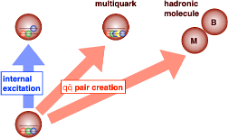Speaker
Description
Hadrons have been understood as a quark-gluon composite state bound by the strong interactions, which is one of the interesting phenomena in the low-energy QCD. As the ordinary hadron picture, baryons and mesons are described as a three-quark state and quark-antiquark state, respectively. In fact, nucleons (protons and neutrons) can be understood as $uud$ and $udd$ baryons. However, accelerator experiments have reported unexpected states called exotic hadrons. The exotics cannot be understood by the ordinary hadron picture. The experimental observations indicate that the exotic hadrons have multiquark structures such as a compact multiquark, e.g. $qq\bar{q}\bar{q}$ and $qqqq\bar{q}$, and a hadron composite state called hadronic molecule. Theorists have studied natures of the exotics by using various approaches e.g. an effective model, QCD sum rules, and lattice QCD. However, the exotic hadron problem is still an open question.
In this work, we study the exotic hadrons by employing the hybrid model considering the mixture of the hadronic molecule and compact state. The hadronic molecular component is expected to be important in exotic hadrons near thresholds. We also discuss the role of the coupling to the compact state, which plays an important role to provide the strong attraction in the hadronic molecule. By employing the hybrid model, we study the $P_c$ and $P_{cs}$ pentaquarks reported by the LHCb collaboration recently. We compute energies of these exotics and also discuss roles of the interactions.

